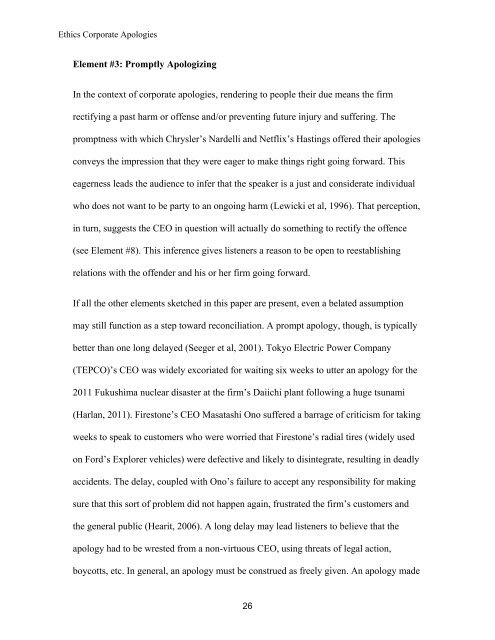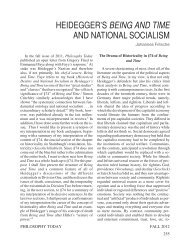Why Saying “I'm Sorry” Isn't Good Enough: The Ethics of Corporate ...
Why Saying “I'm Sorry” Isn't Good Enough: The Ethics of Corporate ...
Why Saying “I'm Sorry” Isn't Good Enough: The Ethics of Corporate ...
Create successful ePaper yourself
Turn your PDF publications into a flip-book with our unique Google optimized e-Paper software.
<strong>Ethics</strong> <strong>Corporate</strong> Apologies<br />
Element #3: Promptly Apologizing<br />
In the context <strong>of</strong> corporate apologies, rendering to people their due means the firm<br />
rectifying a past harm or <strong>of</strong>fense and/or preventing future injury and suffering. <strong>The</strong><br />
promptness with which Chrysler’s Nardelli and Netflix’s Hastings <strong>of</strong>fered their apologies<br />
conveys the impression that they were eager to make things right going forward. This<br />
eagerness leads the audience to infer that the speaker is a just and considerate individual<br />
who does not want to be party to an ongoing harm (Lewicki et al, 1996). That perception,<br />
in turn, suggests the CEO in question will actually do something to rectify the <strong>of</strong>fence<br />
(see Element #8). This inference gives listeners a reason to be open to reestablishing<br />
relations with the <strong>of</strong>fender and his or her firm going forward.<br />
If all the other elements sketched in this paper are present, even a belated assumption<br />
may still function as a step toward reconciliation. A prompt apology, though, is typically<br />
better than one long delayed (Seeger et al, 2001). Tokyo Electric Power Company<br />
(TEPCO)’s CEO was widely excoriated for waiting six weeks to utter an apology for the<br />
2011 Fukushima nuclear disaster at the firm’s Daiichi plant following a huge tsunami<br />
(Harlan, 2011). Firestone’s CEO Masatashi Ono suffered a barrage <strong>of</strong> criticism for taking<br />
weeks to speak to customers who were worried that Firestone’s radial tires (widely used<br />
on Ford’s Explorer vehicles) were defective and likely to disintegrate, resulting in deadly<br />
accidents. <strong>The</strong> delay, coupled with Ono’s failure to accept any responsibility for making<br />
sure that this sort <strong>of</strong> problem did not happen again, frustrated the firm’s customers and<br />
the general public (Hearit, 2006). A long delay may lead listeners to believe that the<br />
apology had to be wrested from a non-virtuous CEO, using threats <strong>of</strong> legal action,<br />
boycotts, etc. In general, an apology must be construed as freely given. An apology made<br />
26

















